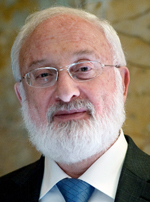
PETACH TIKVAH, Israel — A matter of pride to some and a source of envy to others, the fact is that Jews have traditionally stood out as Nobel Prize recipients, and this year is no exception as Jews have dominated basically all the areas covered by the prestigious awards. As much as our distinctions may inflate our egos, we also see how these achievements have done nothing to erase the hatred against Jews. The world expects something different from us—for Jews to actually deliver connection and peace to the world, which we currently are not succeeding at. This is the reason the animosity won’t go away.
2020 has been remarkably successful for American Jewish laureates. Harvey Alter shared the Nobel Prize in Medicine, Paul Milgrom shared the award in Economic Sciences, and Louise Glück won the Literature award. Some publications have written that the three recipients of the Physics award are also of Jewish heritage. People highlight the fact that out of the 900 Nobel Prize recipients since 1901 when it was first awarded, more than 200 have been Jewish, a disproportionate number for a group that represents only 0.2% of the global population.
The capabilities of Jews in countless areas are no secret and if we were to award the highest prizes and recognitions based on accomplishments in all fields, Jews would receive even more awards than we already do. However, I do not think getting medals or trophies should be a reason for Jewish pride. I do not spend time counting the number of awards because it is not what we need to stand out for. We need to be prominent for fulfilling the role that the world truly expects from us.
Jews have a mission that is deeply rooted in the basis of creation, to be a “light unto the nations.” What exactly does this mean? It means to serve humanity as an example of corrected relationships of connection and love for others, of positive mutual connection.
We Jews, by virtue of our unique development as a people, once had the ability to examine everything from two opposite forces, reception and bestowal, which gave us a deeper and broader view of reality. Since the ruin of the Temple, we lost our spiritual consciousness, but due to our previous attainment of the unique singular force of nature, this matchless spark illuminated in us and left an eternal seal.
This spark gave us a significant advantage over others. This is what has enabled us to succeed and stand out, because this spark is part of the general creative force that develops the entirety of nature. It is what motivated us to invent and innovate, and thus to advance humanity as a whole. As it was written by the greatest Kabbalist of our generation, Rav Yehuda Ashlag (Baal HaSulam), “It is the wisdom of faith, justice and peace which most nations learn from us, and this wisdom is ascribed to us alone.” (The Writings of the Last Generation)
Today, the world is in urgent need of unity to overcome its perils and the suffocating crisis that exists at all levels of experience, but humanity has no idea how to connect. However, we Jews were once connected and lived in brotherly love. The society that the Jewish nation innovated was based on the great rule of the Torah, “love your neighbor as yourself.” Therefore, we people of Israel must now revive that love between us and offer it to the world. This is what the world requires, and when we do not provide this example—instead remaining immersed in growing alienation, mistrust, and self-centeredness—the pressures against us manifest as vicious antisemitism.|
Therefore, we Jews must begin connecting between us, since we possess the latent “memory” of unity, and we also must welcome anyone from any nation who shares this view. If we accomplish this, we will be able to fulfill the ancient prophecy that says that the nations of the earth will be blessed through us. When we achieve this, we will deserve the ultimate prize of all, peace and goodness in the world.
*
Michael Laitman, Ph.D., studied philosophy and Kabbalah at the Russian Academy of Sciences in Moscow, and now resides in Petach Tikvah, Israel. He has published more than 40 books on a variety of topics.